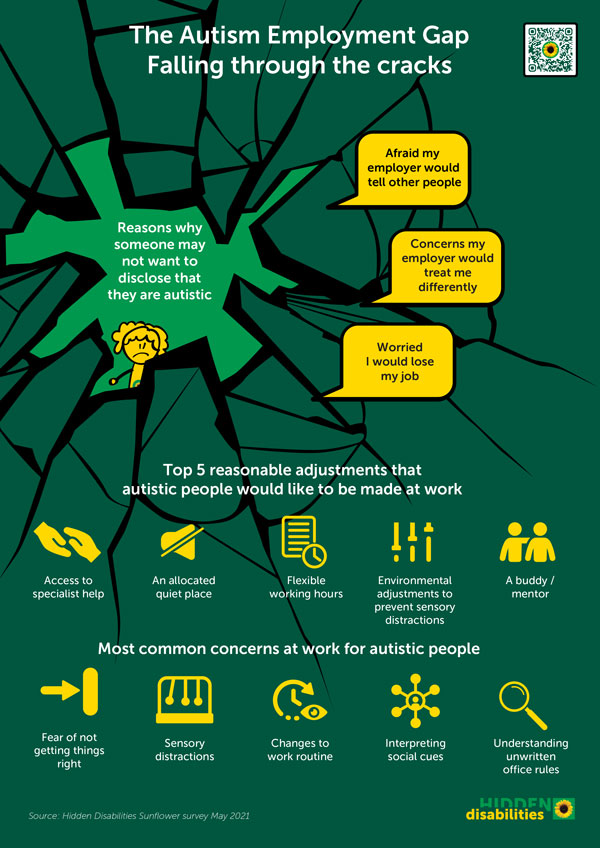In our recent 'Falling through the cracks' autism employment survey, 74% of the respondents were autistic and 13% were responding on behalf of someone that is autistic. 89% of respondents were based in the UK.
Employment status
Work is not always appropriate for everyone as our survey found with 25% of respondents unable to work with 75% of people able to work. Although only 50% of respondents were currently employed (full or part time). That's quite a large disparity between those able to work (75%) and those currently employed (50%), in fact it's an unemployment rate of 25%, to put this in perspective the current UK unemployment rate is 4.8%.
Types of jobs
We found that 55% of respondents worked in support or junior roles. Our respondents work in an array of different industries, breaking down the typical stereotype that autistic people all want to work in IT or with data. The top three industries employing our autistic responders were healthcare, education and retail (supermarket/grocery).
The recruitment process
Over half of our respondents found work relatively quickly, with 50% securing a role when applying for under 20 jobs.
63% of respondents found application forms difficult to complete.
Nearly a third of candidates left the interview not knowing what would happen next in the recruitment process. However, most understood what the job was with only 10% being unclear of what the job entailed post interview.
Reasonable adjustments
56% of our survey have no reasonable adjustments made for them at work, despite 64% of respondents having told their employer of their condition. Although, 31% have had reasonable adjustments made, that's still 33% of employers making no adjustments despite being made aware of their employees autism. The most common reasonable adjustment made was flexible working. Closely followed by adjustments to the working environment (ear defenders, quiet desk, lighting) and more frequent meetings with their line manager.
When asked what more could be done to assist you at work, 59% of our survey would like access to specialist help, 57% would like to be allocated a quiet place that they can take themselves to and 52% would like flexible working hours.
When asked what their biggest fear at work was the most common answer was a fear of not getting things right. Followed by changes to routine and finally sensory distractions. In the free text answers work place bullying and feeling overwhelmed were sited.
Disclosure
Most respondents have told their employer of their condition (64%). With 37% disclosing before they accepted the job and 57% telling their employer afterwards.
Only 45% of our survey had told their colleagues (compared with 64% telling their employer).
Of those that had not disclosed their condition, the most common reason for keeping it hidden was a fear of being treated differently by their employer. Followed by concerns about losing their job and their employer telling other people.
Despite 64% of respondents telling their employer about their condition, 53% felt that their employer did not understand the challenges that they face at work – and a further 21% were neutral on this question. There is clearly more that employers could be doing in terms of empathy.
Discrimination in the work place
Although, many respondents 'felt valued and respected by colleagues' with 45% agreeing and strongly agreeing with this statement. 64% of our survey felt judged at work as a result of their autism with almost half (49%) of our survey having experienced verbal abuse at work for being autistic.
Despite this, respondents were still 'inspired to meet their goals at work' with 46% either agreeing or strongly agreeing to this statement. This is in spite of the fact that most saw limited career progression available to them with most people disagreeing with the statement 'I feel confident that I can develop my career at my company' (over 50%).
Most felt that their performance was evaluated fairly (36%). But again when it came to career progression, sentiment swayed the other way with most disagreeing with the statement 'promotion decisions are fair at my company' (38% disagree vs 19% agree).
We'd like to thank everyone that took the time to participate in our Autism Employment survey, the results of which we'll be sharing with all of the organisations that have adopted the Sunflower. We hope that by sharing this information we can help businesses become more inclusive and accessible work places, not just for autistic people, but for all disabled people.



